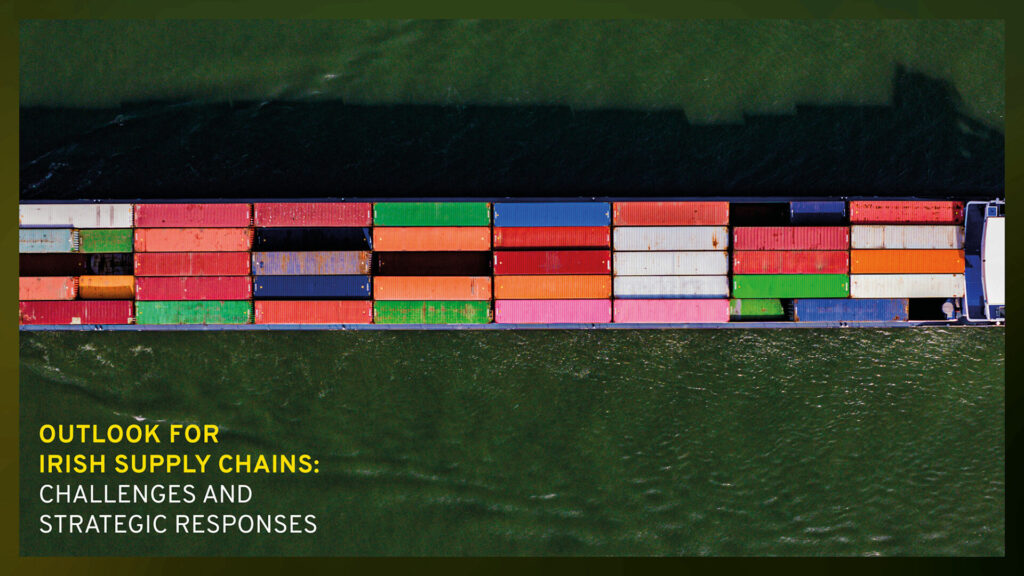Over the next 12 months, Irish supply chains are expected to face several complex challenges. There is continued economic uncertainty, and fluctuating global markets are creating headwinds for businesses across various sectors. From geopolitical tensions to natural disasters, the need for improved operational performance and robust supply chains has never been more critical (KPMG). However, the supply chain market in Ireland is bigger than ever, and many companies are diversifying faster than ever to cope with these challenges.
Persistent Disruptions: Ongoing disruptions, which are driven by geopolitical tensions, such as the war in Ukraine and renewed COVID-19-related shutdowns in regions like China, are impacting the reliability of global supply chains. Notably, 67% of Irish companies report that the war in Ukraine has negatively influenced their supply chains.
Rising Costs: Escalating fuel prices and inflationary pressures are straining operational budgets and increasing business costs. Approximately 75% of Irish companies cite soaring energy costs as a significant obstacle.
Talent Shortages: The struggle to attract and retain skilled professionals remains a significant concern, particularly in logistics, manufacturing, and tech-enabled supply chain roles. The logistics sector, for instance, faces a shortage with 31% of HGV drivers aged 55 or older. As of early 2024, there were over 30,000 vacancies in Ireland’s logistics and supply chain sector, with demand projected to remain high through 2025.
Sustainability Demands: Growing emphasis on environmental performance and green credentials is pushing companies to rethink and redesign their supply chains to stay competitive in international markets. However, according to a report by Grant Thornton, 41% of mid-sized Irish businesses currently lack a formal sustainability strategy, and 38% cite the time and resources required for ESG compliance as a significant barrier.
Trade Policy Uncertainty: The reintroduction of tariffs by the United States under President Donald Trump’s administration adds a new layer of complexity. A 10% tariff on all imports, with higher rates for countries with significant trade surpluses, has been imposed, affecting key Irish export sectors such as pharmaceuticals, technology, and food products. According to economic analyses, this move could potentially reduce Ireland’s GDP by up to 3.7% over the next five to seven years.
How Organisations are Responding
Despite global uncertainties, Irish exporters remain optimistic. According to Dr Chantelle McCann Kiernan, Departmental Manager for Innovation and R&D at IDA Ireland, the key to addressing these challenges is to invest in supply chain improvements, particularly with advancing technologies. Irish companies are taking many steps to tackle these challenges as follows:
- Supplier Diversification: Companies are diversifying their supply chains to mitigate risks associated with over-reliance on single suppliers. For instance, Dunnes Stores has enhanced its partnerships with local suppliers like Sheridan’s Cheesemongers and Nourish, integrating them into their retail offerings to ensure a more resilient supply chain.
- Digital Transformation: Embracing advanced technologies, companies are investing in Iot in AI and blockchain to enhance supply chain visibility and efficiency. Heineken Ireland, for example, has implemented global digital solutions to streamline local operations, focusing on sustainability and adaptability.
- Enhanced Collaboration: Firms are strengthening collaboration across the supply chain ecosystem by sharing data, coordinating logistics, and jointly addressing challenges. This collaborative approach helps in creating more integrated and efficient supply chains. For instance, Unilever has partnered with logistics providers to create shared warehousing solutions that cut costs and emissions.
- Resilience Planning: Companies are proactively developing contingency plans, such as stockpiling critical inventory and establishing alternative logistics routes. This strategy is crucial for maintaining operations during unforeseen disruptions. Nestlé, for example, has implemented dual sourcing strategies and developed regional manufacturing hubs to mitigate risks from geopolitical tensions and transportation delays.
- Sustainability Integration: Integrating sustainability into supply chain strategies is a growing focus. Enterprise Ireland’s strategy aims to reduce CO₂ emissions by 35% by 2030 and increase R&D investment to €2.2 billion annually, supporting companies in adopting eco-friendly practices.
In an increasingly dynamic environment, companies are demonstrating agility and innovation to navigate supply chain challenges effectively.
More about Cliodhna…
Cliodhna O’Brien is the Business Lead of Barden’s Supply Chain & Procurement in Munster. Connect with Cliodhna on LinkedIn or at cliodhna.obrien@Barden.ie


 Jump Back
Jump Back

